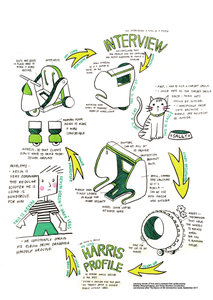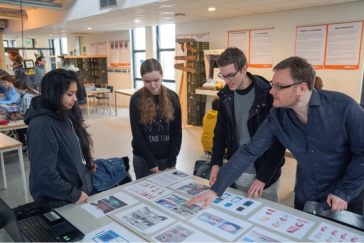Engineering students have to learn to create robust solutions in professional contexts where new technologies emerge constantly and sometimes disrupt entire industries. The question rises if universities design curricula that enable engineering students to acquire these cognitive skills. The Cynefin Framework (Kurtz & Snowden, 2003; Snowden & Boone, 2007) can be used to typify four complexity contexts a system or organisation can be found in: chaos, complex, complicated and obvious.The Cynefin framework made it possible to create the research question for a case-study: To what extend does the Business Engineering curriculum enable bachelors to find business solutions in the complexity contexts of the Cynefin framework? The results show that 80% of the methods are suitable for complicated contexts and no distinction is made between contexts. This means students are taught to approach most contexts in the same way and are not made aware of differences between the contexts. Making sense of the methods in the curriculum with the Cynefin framework was insightful and suggestions for improvement and further research could be substantiated
DOCUMENT

Industrial Design Engineering [Open] Innovation (IDE) is a 3-year, English taught, VWO entry-level, undergraduate programme at The Hague University of Applied Sciences (THUAS). The IDE curriculum focuses on the fuzzy front end of (open) innovation, sustainable development, and impact in the implementation phase of product-service design. The work field of Industrial Design Engineering and Open Innovation, like many other domains, is growing increasingly more complex (Bogers, Zobel, Afuah, Almirall, Brunswicker, Dahlander, Frederiksen, Gawer, & Gruber, 2017). Not only have the roles of designers changed considerably in the last decades, they continue to do so at increasing speed. Therefore, industrial design engineering students need different and perhaps more competencies as young professionals in order to deal with this new complexity. Moreover, in our transitional society, lifelong learning takes a central position (Reekers, 2017). Students need to give their learning path direction autonomously, in accordance with their talents and interests. IDE’s Quality & Curriculum Committee (QCC) realized in 2015 there is too much new knowledge to address in a 3-year programme. Instead, IDE students need to learn how to become temporary experts in an array of topics, depending on the characteristics of each new project they do (see Textbox 1). The QCC also concluded that more than just incremental changes to the current curriculum were needed; thus, the idea for a flexible, choice-based semester approach in the curriculum was born: ‘Curriculum M’ (Modular). A co-creational approach was applied, in which teaching staff, students, alumni, prospective students, industry (including the (international) social profit sector), and educational advisors collaborated to develop a curriculum that would allow students to become not just T-shaped (wide basis, one expertise) professionals, but U- or W-shaped professionals, with strong links to other disciplines.
DOCUMENT

The implementation of the Ment4EU curriculum on social mentoring (Ciff & Brady, 2025) marked a historic milestone in the advancement of mentorship practices within Europe. Held in Leeuwarden, Netherlands, from 3 to 7 February 2025 as a blended intensive program, this initiative stands as the first known enterprise of its kind in the region. It successfully brought together approximately 250 participants from 29 countries, uniting academics, researchers, practitioners, and students who shared a passion for fostering social mentoring as a transformative tool for inclusion, education, and personal and professional development. This evaluation report serves as a comprehensive reflection on the outcomes of the program, assessing its methodologies, impact, and the exchanges that took place among participants. Through a detailed examination, I aimed to highlight the strengths of this pioneering initiative, identify areas for refinement, and explore pathways for broader implementation across Europe. The discussions, collaborations, and insights generated during this event have laid the groundwork for future advancements in structured mentoring, emphasizing its essential role in social cohesion and knowledge-sharing. Through this comprehensive exploration, the report aims to contribute to the ongoing discourse on social mentoring, offering insights into best practices, challenges, and opportunities for expanding mentorship frameworks in European academic institutions. This evaluation report is part of the Erasmus Plus Cooperation Partnership in Higher Education “Mentoring forSocial Inclusion in Europe: Sharing Knowledge and Building Capacity” (Ment4EU), project number 2023-1-AT01-KA220-HED-000158214
DOCUMENT

Postdoc research project Transformation through Interactive Narrative DesignMedia psychologist dr. Christian Roth's postdoc project Transformation through Interactive Narrative Design (TIND) is part of the Professorship Performative Creative Processes, the school Games & Interaction, and the Expertisecentrum Onderzoek, Innovatie en Internationalisering (OOI). Here, Christian interweaves education and practice-oriented research. He studies the artistic, pedagogical and academic perspectives regarding the power of transformation through applied Interactive Narrative Design (IND).Within the two-year postdoc research project TIND, Christian studies the training of interactive narrative designers with the goal of developing teaching methods and learning tools for artists and designers, such as game and interaction designers, to enable them to create more effective artefacts.Why interactive narrative design?IND offers agency, defined as the ability to influence narrative progression and outcomes in a meaningful way. As such, it carries the potential to create and emotional impact and spark transformative change. This enables interactors to explore different points of view and to feel the weight of their own choices and consequences. This, in turn, allows for a more thorough understanding of complex multi-stakeholder issues, which could have a significant impact on the success of emerging artistic, and learning applications.The TIND project will enable designers through an interdisciplinary approach, including applied game design, immersive theatre, behavioral and cognitive psychology, and the learning sciences.A good example for offering different perspectives on a complex topic is the narrative simulation Mission Zhobia: Winning the Peace, which is used for the training of peacekeepers. Or the news game, I am Mosul, which aims to raise awareness around the effects of war by bringing it close to home: choose your Dutch city and make choices on how to survive if the war was there. And the interactive story Adventures with Anxiety offers a new understanding by letting interactors play anxiety embodied within a wolf. IND is a complex and challenging interdisciplinary field in which design knowledge from other media can often not be directly transferred. As a new medium, it introduces new affordances in technique and user experience. This requires practice-based research for further development of the educational format, demonstrating its potential while identifying and overcoming common learners’ challenges. This project aims to develop a framework for the design and evaluation of meaningful interactive narrative experiences that effectively stimulate a variety of cognitive and emotional responses such as reflection, insight, understanding, and potential behavior change. It provides tools, methods and activities to enable aspiring or practicing narrative designers through an interdisciplinary approach, including game design, immersive theatre, behavioral and cognitive psychology, and the learning sciences.HKU education means to prepare students for success in the creative industries and IND plays an important role for current and future jobs in education, arts and entertainment. IND has the potential to create an emotional impact and spark transformative change by offering agency, defined as the ability to influence narrative progression and outcomes in a meaningful way. This enables interactors to feel the weight of their own choices and their consequences, to explore different perspectives, and to more thoroughly understand complex multi-stakeholder issues, which could have significant impact on the success of emerging artistic, and learning applications.The planned output is a collection of design tools and methods for interdisciplinary workshops and courses, which can be integrated into different curricula at the HKU, thereby enhancing existing programs while enabling the refinement of training methods. Once completed, this postdoc project delivers a training method with multiple applications designed to harness the power of interactive storytelling for transformative personal and societal impact.ColloborationsThe research project is directly embedded in the curriculum of the HKU schoolGames & Interaction with annual educational offerings such as the Minor Interactive Narrative Design (MIND) and HKU wide broad seminars. Course evaluation and literature research will be used to create new and adjusted training for different HKU schools and the industry.More informationAre you interested to learn more about the postdoc research project Transformation through Interactive Narrative Design? Get in touch with Christian Roth: christian.roth@hku.nl

Within TIND, Christian Roth studies the training of interactive narrative designers with the goal of developing teaching methods and learning tools for artists and designers to enable the creation of more effective artefacts. Interactive Narrative Design (IND) is a complex and challenging interdisciplinary field introducing new affordances in technique and user-experience. This requires practice-based research for further development of the educational format, demonstrating its potential while identifying and overcoming common learners’ challenges. This project aims to develop a framework for the design and evaluation of meaningful interactive narrative experiences that effectively stimulate a variety of cognitive and emotional responses such as reflection, insight, understanding, and potential behavior change. It provides tools, methods and activities to enable aspiring or practicing narrative designers through an interdisciplinary approach, including game design, immersive theatre, behavioral and cognitive psychology, and the learning sciences. HKU education means to prepare students for success in the creative industries and IND plays an important role for current and future jobs in education, arts and entertainment. IND has the potential to create an emotional impact and spark transformative change by offering agency, defined as the ability to influence narrative progression and outcomes in a meaningful way. This enables interactors to feel the weight of their own choices and their consequences, to explore different perspectives, and to more thoroughly understand complex multi-stakeholder issues, which could have significant impact on the success of emerging artistic, and learning applications. The research project is directly embedded in the curriculum of the HKU school Games & Interaction with annual educational offerings such as the Minor Interactive Narrative Design (MIND) and HKU wide broad seminars. Course evaluation and literature research will be used to create new and adjusted training for different HKU schools and the industry. Outcomes will be shared via an interactive website and events.